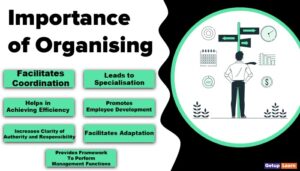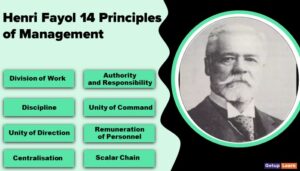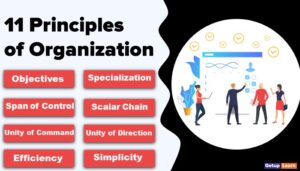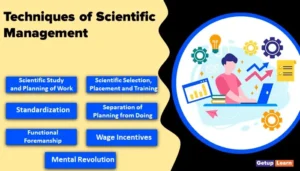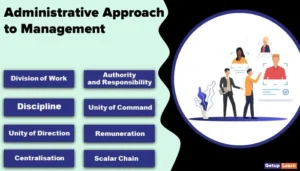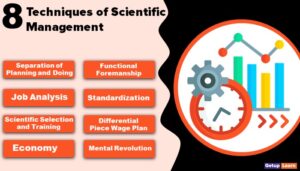Table of Contents
- 1 What is Planning in Management?
- 2 Definition of Planning in Management
- 3 Nature of Planning in Management
-
4 Importance of Planning in Management
- 4.1 Reduction of Uncertainty
- 4.2 Better Utilization of Resources
- 4.3 Increases Organizational Effectiveness
- 4.4 Reduces Cost of Performance
- 4.5 Concentration on Objectives
- 4.6 Helps in Coordination
- 4.7 Makes Control Effective
- 4.8 Encouragement to Innovation
- 4.9 Increase in Competitive Strength
- 4.10 Delegation is Facilitated
- 5 Features of Planning in Management
- 6 Principles of Planning in Management
- 7 Approaches to Planning in Management
-
8 FAQ Related to Planning in Management
- 8.1 What is meaning of planning in management?
- 8.2 What is definition of planning in management?
- 8.3 What is best definition of planning?
- 8.4 What are the definition of planning by different authors?
- 8.5 What are the nature of planning in management?
- 8.6 What are the importance of planning in management?
- 8.7 What are the features of planning in management?
- 8.8 What are the principles of planning in management?
- 8.9 What are the approaches to planning in management?
What is Planning in Management?
Planning is the first and foremost function of Management. Planning (also called forethought) is the process of thinking about and organizing the activities required to achieve the desired goal. Planning involves the creation and maintenance of a plan.
As such, planning is a fundamental property of intelligent behavior. This thought process is essential to the creation and refinement of a plan, or integration of it with other plans; that is, it combines forecasting of developments with the preparation of scenarios of how to react to them.
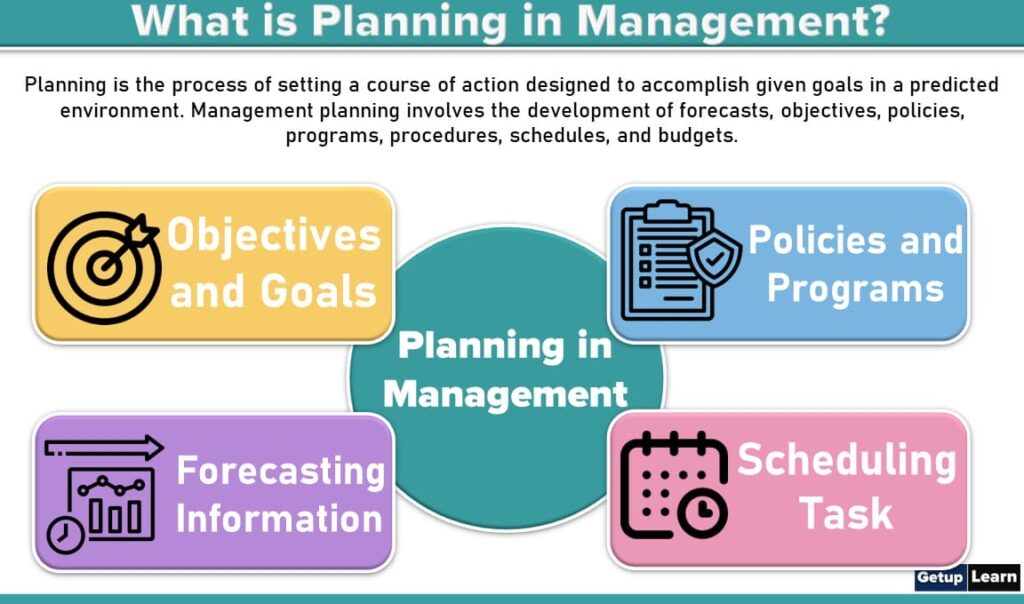
In simple words, planning is deciding in advance what is to be done, when where, how, and by whom it is to be done. Planning bridges the gap from where we are to where we want to go. It includes the selection of objectives, policies, procedures, and programs from among alternatives.
A plan is a predetermined course of action to achieve a specified goal. It is an intellectual process characterized by thinking before doing. It is an attempt on the part of the manager to anticipate the future in order to achieve better performance. Planning in management is the primary function.
Definition of Planning in Management
These are the following definitions of planning in management by authors:
[su_quote cite=”George Terry“]Planning is the selecting and relating of facts and the making and using of assumptions regarding the future in the visualization and formulation of proposed activities believed necessary to achieve desired results.” According to Terry planning is based on certain assumptions which are required to formulate policies of the business. The purpose of planning is to achieve business objectives.[/su_quote]
[su_quote cite=”Koontz and O’Donnell“]The selection from among alternatives for future courses of action for the enterprise as a whole and each department with it.” Although the exact future can seldom be predicted and factors beyond control may interfere with the best-laid plans, unless there is planning, events are left to chance. It is an intellectually demanding process and requires the selection of a course of action.[/su_quote]
[su_quote cite=”C.L. Hudson“]To plan is to produce a scheme for future actions to bring about specific results, at the specified period of time. It is a deliberate attempt to influence, exploit, bring about and control the nature, direction, extent, speed, and effects of change.[/su_quote]
[su_quote cite=”Tansik and Chase“]Planning is the process of setting a course of action designed to accomplish given goals in a predicted environment.[/su_quote]
[su_quote cite=”According to Luis A Allen“]Management planning involves the development of forecasts, objectives, policies, programs, procedures, schedules, and budgets[/su_quote]
Nature of Planning in Management
These are the following nature of planning in management given below:
- Planning is an Intellectual Process
- Planning Contributes to Objectives
- Planning is a Primary Function of Management
- A Continuous Process
- Planning Pervades Managerial Activities
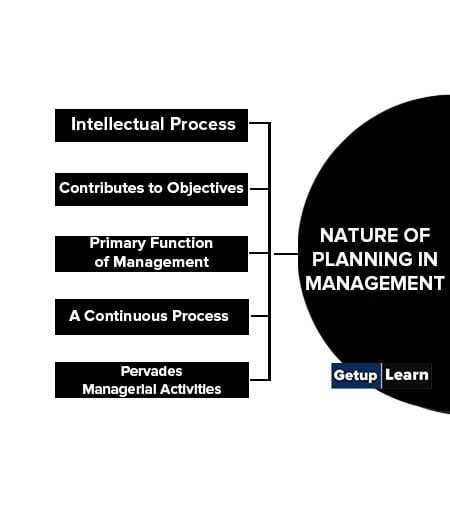
Planning is an Intellectual Process
Planning is an intellectual process of thinking in advance. It is a process of deciding the future of the series of events to follow. Planning is a process where a number of steps are to be taken to decide the future course of action.
Managers or executives have to consider various courses of action, achieve the desired goals, go into detail about the pros and cons of every course of action, and then finally decide what course of action may suit them best.
Planning Contributes to Objectives
Planning contributes positively to attaining the objectives of the business enterprise. Since plans are there from the very first stage of operation, the management is able to handle every problem successfully.
The plan tries to set everything right. A purposeful, sound, and effective planning process knows how and when to tackle a problem. This leads to success. Objectives thus are easily achieved.
Planning is a Primary Function of Management
Planning precedes other functions in the management process. Certainly, setting goals to be achieved and lines of action to be followed precedes the organization, direction, supervision, and control.
No doubt, planning precedes other functions of management. It is a primary requisite before other managerial functions step in. But all functions are interconnected. It is mixed in all managerial functions but there too it gets precedence. It thus gets primary everywhere.
A Continuous Process
Planning is a continuous process and a never-ending activity of a manager in an enterprise based upon some assumptions which may or may not come true in the future. Therefore, the manager has to go on modifying revising, and adjusting plans in light of changing circumstances.
According to George R. Terry, “Planning is a continuous process and there is no end to it. It involves the continuous collection, evaluation, and selection of data, scientific investigation and analysis of the possible alternative courses of action, and the selection of the best alternative.
Planning Pervades Managerial Activities
Primary planning follows the pervasiveness of planning. It is the function of every managerial personnel. The character, nature, and scope of planning may change from personnel to personnel but the planning as an action remains intact.
According to Billy E. Goetz, “Plans cannot make an enterprise successful. Action is required, the enterprise must operate managerial planning seeks to achieve a consistent, coordinated structure of operations focused on desired trends. Without plans, action must become merely activity producing nothing but chaos.”
Importance of Planning in Management
These are the following importance of planning in management given below:
- Reduction of Uncertainty
- Better Utilization of Resources
- Increases Organizational Effectiveness
- Reduces Cost of Performance
- Concentration on Objectives
- Helps in Coordination
- Makes Control Effective
- Encouragement to Innovation
- Increase in Competitive Strength
- Delegation is Facilitated
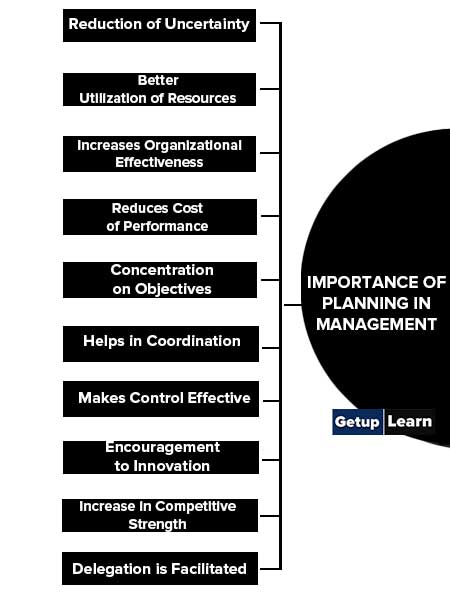
Reduction of Uncertainty
The future is always full of uncertainties. A business organization has to function in these uncertainties. It can operate successfully if it is able to predict uncertainties. Some of the uncertainties can be predicted by undertaking systematic.
Some of the uncertainties can be predicted by undertaking systematic forecasting. Thus, planning helps in foreseeing uncertainties that may be caused by changes in technology, fashion, and taste of people, government rules and regulations, etc.
Better Utilization of Resources
An important advantage of planning is that it makes effective and proper utilization of enterprise resources. It identifies all such available resources and makes optimum use of these resources.
Increases Organizational Effectiveness
Planning ensures organizational effectiveness. Effectiveness ensures that the organization is in a position to achieve its objective due to increased efficiency of the organization.
Reduces Cost of Performance
Planning assists in reducing the cost of performance. It includes the selection of only one course of action amongst the different courses of action that would yield the best results at a minimum cost. It removes hesitancy, avoids crises and chaos, eliminates false steps, and protects against improper deviations.
Concentration on Objectives
It is a basic characteristic of planning that is related to organizational objectives. All the operations are planned to achieve the organizational objectives. Planning facilitates the achievement of objectives by focusing attention on them.
It requires a clear definition of objectives so that the most appropriate alternative courses of action are chosen.
Helps in Coordination
Good plans unify the interdepartmental activity and clearly lay down the area of freedom in the development of various sub-plans. Various departments work in accordance with the overall plans of the organization.
Thus, there is harmony in the organization, and duplication of efforts and conflict of jurisdiction are avoided.
Makes Control Effective
Planning and control are inseparable in the sense that unplanned action cannot be controlled because control involves keeping activities on the predetermined course by rectifying deviations from plans. Planning helps control by furnishing standards of performance.
Encouragement to Innovation
Planning helps innovative and creative thinking among managers because many new ideas come to the mind of a manager when he is planning. It creates a forward-looking attitude among the managers.
Increase in Competitive Strength
Effective planning gives a competitive edge to the enterprise over other enterprises that do not have planning or have ineffective planning. This is because planning may involve expansion of capacity, changes in work methods, changes in quality, the anticipation of tastes and fashions of people and technological changes, etc.
Delegation is Facilitated
A good plan always facilitates the delegation of authority in a better way to subordinates.
Features of Planning in Management
Let’s deeply understand the features of planning in management:
- Primary Function of Management
- Adaptive to Environment
- Future Oriented
- Goal Oriented
- Pervasive
- Intellectual Process
- Efficient
- Flexible
- Planning and Decision-Making
- Feedback
- Open System Approach
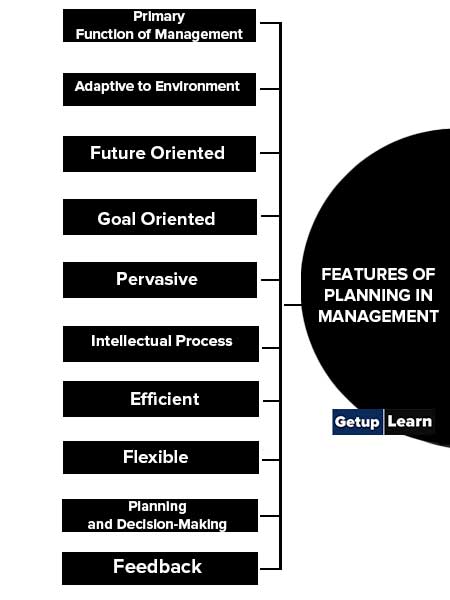
Primary Function of Management
Planning is the first function of management. All other functions follow planning. If planning is wrong, organization structures will be faulty, people will carry out wrong plans, motivation and leadership policies will be ineffective and controls will also aim to achieve faulty plans. This will result in huge losses for the organization.
Adaptive to Environment
Planning is a continuous process. It is done so that organizations can survive in the changing environment. Managers incorporate changes in the environment like competitors’ policies, consumers’ tastes, economic policies, and value systems of the society in their plans, and planning is, thus, adaptive to the environment.
Future Oriented
Planning is looking ahead. It fills the gap between where we are and where we want to go. It prepares organizations to meet future challenges and opportunities. Future being uncertain, managers adopt scientific methods of forecasting.
They anticipate the future and incorporate changes in their activities to achieve organizational goals effectively. Correct forecasting helps in making sound business decisions.
Goal Oriented
Planning is done to achieve the desired goals. Planning is, thus, goal oriented. It clearly lays down the goals and ways to achieve them.
Pervasive
Planning is a pervasive function. It is done for all organizations – business and non-business, profitable and non-profitable, small and big. In a business organization, it is done at each level; top, middle and low.
The nature and scope of planning, however, are different at different levels; top managers plan for the organization as a whole, middle-level managers plan for their departments and lower-level managers plan for their operating units.
Intellectual Process
Planning is a complex process. Managers cannot plan unless they analyze the past, present, and future environment. It is difficult to predict the future as it keeps changing. Managers have to conceptually and analytically excel in making plans that can be implemented.
They should have judgment, intuition, foresightedness, imagination, etc. to make good plans. Planning, thus, cannot be done in dark. It is an intellectual process.
Efficient
Efficient means cost-effective. Time and money are spent on planning to earn gains in the future. A trade-off is maintained (comparison between cost and returns) and managers ensure that expected gains are more than the current costs. Efficiency means “the achievement of the ends with the least amount of resources.
Flexible
Planning relates to the future. The future is uncertain, and plans will fail to achieve the objectives if unexpected changes take place in the future. Managers have to be quick in changing their plans so that future changes do not fail the plans. Planning is, thus, a flexible activity.
Planning and Decision-Making
Planning involves decision-making. Choosing goals out of multiple goals, deciding about ways to achieve them out of a number of alternatives, deciding about sources from where funds will be raised, deciding about the optimum allocation of resources over different goals and departments, etc. are some of the choices that managers make to run an organization effectively.
Planning continuously involves decision-making. In fact, the process of decision-making starts much before the process of planning.
Feedback
Planning is closely related to control. It specifies future actions and control ensures those actions are carried out. Planning frames organizational goals and control ensures those goals are achieved.
The controlling function provides constant feedback about the efficacy of plans. Deviations (if any) in actual performance against planned performance help in reviewing or abandoning plans to make fresh plans.
Open System Approach
Almost all organizations are open systems as they interact with the environment (input-conversion-output) in their desire to reach the future stated goals. In bridging the gap between the present and the future, the open system approach helps the organization in responding to environmental challenges.
Principles of Planning in Management
As a primary function of management, planning requires some systematic principles. The well-known writers Koontz and O’Donnell have formulated certain fundamental principles of planning for the benefit of managers.
These are the following principles of planning in management:
- Principle of Contribution to Objectives
- Principle of Efficiency
- Principle of Primacy of Planning
- Principle of Planning Premises
- Principle of Timing
- Principle of Commitment
- Principle of Flexibility
- Principle of Navigational Change
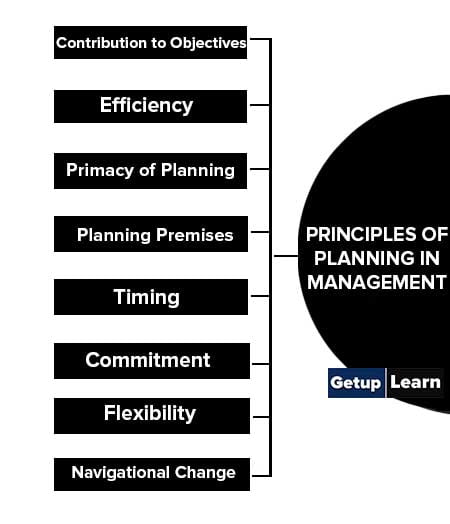
Principle of Contribution to Objectives
The plans would focus on desired goals. Every plan and all derivative plans must contribute to the achievement of group objectives.
Principle of Efficiency
A plan is efficient if it brings minimum economic and social costs. Its results must be greater than its unsought consequences.
Principle of Primacy of Planning
This principle emphasizes that a manager can hardly undertake organizing, staffing, directing, or controlling without plans to guide him. Hence, planning must precede the execution of all other managerial functions.
Principle of Planning Premises
For coordinated planning, it must be formulated on the basis of market forecasts, proper data, existing company policies and plans, and the anticipated internal environment.
Principle of Timing
Timing is an important attribute of any plan. Timing must be adhered to in the execution of plans. Plans should be timed with the supporting Programme.
Principle of Commitment
The planning period should be justifiable to fulfill the promises and commitments made by the manager. Koontz and O’Donnell write, “Long-range planning is not really planning for future decisions but rather planning the future impact of today’s decisions.
Principle of Flexibility
The ideal planning is to be flexible. This principle applies to the building into plans, “an ability to change direction” so as to minimize the losses from unexpected events. The plans must have built-in flexibility.
Koontz and O’Donnell write, “The ability to change a plan without undue cost or friction, to detour, to keep moving towards a goal despite changes in the environment has great value.
The principle of planning indicates that a manager, like a navigator, must continually check his course and redraw plans to meet the desired goal. According to Koontz and O’Donnell, “the manager manages the plan; he is not managed by it.
Approaches to Planning in Management
Managers follow various approaches to planning based on the extent of participation, authority, delegation, and competency level of managers working at various levels. Let’s understand the approaches to planning in management:
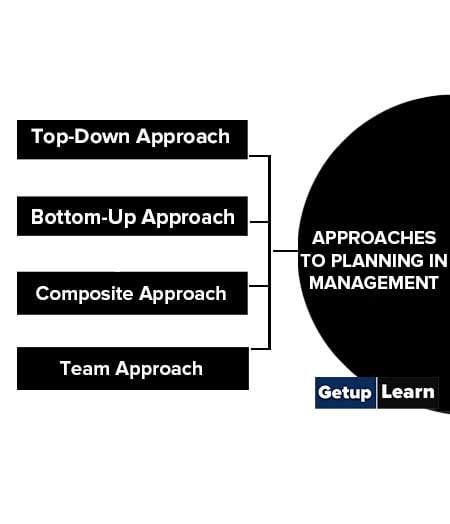
Top-Down Approach
In most family-owned enterprises, authority and responsibility for planning are centralized at the top. The top management defines the mission, lays down strategies, and specific action plans to achieve the stated goals, and then passes them on to the people working at lower levels.
Bottom-Up Approach
Thinking and doing aspects in the planning pro- cess are two sides of the same coin. Hence, if lower-level managers are drawn into the preparation and implementation of plans, their loyalty and commitment would go up automatically.
Composite Approach
In this approach, a middle path is chosen to facilitate the smooth implementation of the plans. Here the top management offers guidelines, sees boundaries, and encourages the middle and lower-level executives to come out with a tentative plan.
Team Approach
In this, the job of planning is assigned to a team of managers having requisite experience in various functional areas. They prepare the draft plans, taking internal as well as external factors into account. The tentative plans are forwarded to the top management for approval.
What is meaning of planning in management?
Planning involves forecasting, framing objectives of the firm, thinking of different courses of action and deciding the best course of action to achieve the goals. Planning, thus, involves decision making, that is, deciding a course of action for framing and achieving objectives.
What is definition of planning in management?
Planning is the process of setting a course of action designed to accomplish given goals in a predicted environment. By Tansik and Chase
What is best definition of planning?
Planning is deciding in advance what is to be done. It involves the selection of objectives, policies, procedures and programmes from among alternatives. By M. E. Hurley
Following are the best definition of planning by different authors:
1. Planning is fundamentally, the choosing function and planning problems will arise only when an alternative course of action is discovered. By Bill E. Goetz
2. Planning is deciding in advance what to do it, when to do, and who is to do it. It bridges the gap from where we are, to where we want to go. It makes it possible for things to occur which would not otherwise happen. By Koontz and O’Donnel
3. Management planning involves the development of forecasts, objectives, policies, programmes, procedures, schedules and budgets.” According to Allen, planning is essentially deciding about future. The ways and means required to achieve organisational goals form the essential part of planning. By Louis A. Allen.
What are the nature of planning in management?
Following are the nature of planning in management:
1. Planning is an Intellectual Process
2. Planning Contributes to Objectives
3. Planning is a Primary Function of Management
4. A Continuous Process
5. Planning Pervades Managerial Activities.
What are the importance of planning in management?
Following are the importance of planning in management:
1. Reduction of Uncertainty
2. Better Utilization of Resources
3. Increases Organizational Effectiveness
4. Reduces Cost of Performance
5. Concentration on Objectives
6. Helps in Coordination
7. Makes Control Effective
8. Encouragement to Innovation
9. Increase in Competitive Strength
10. Delegation is Facilitated.
What are the features of planning in management?
Following are the features of planning in management:
1. Primary Function of Management
2. Adaptive to Environment
3. Future Oriented
4. Goal Oriented
5. Pervasive
6. Intellectual Process
7. Efficient
8. Flexible
9. Planning and Decision-Making
10. Feedback
11. Open System Approach.
What are the principles of planning in management?
Following are the principles of planning in management:
6. Principle of Contribution to Objectives
2. Principle of Efficiency
3. Principle of Primacy of Planning
4. Principle of Planning Premises
5. Principle of Timing
6. Principle of Commitment
7. Principle of Flexibility
8. Principle of Navigational Change.
What are the approaches to planning in management?
Following are the approaches to planning in management:
1. Top-Down Approach
2. Bottom-Up Approach
3. Composite Approach
4. Team Approach.






